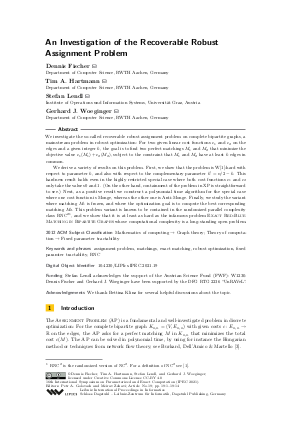An Investigation of the Recoverable Robust Assignment Problem
Authors Dennis Fischer, Tim A. Hartmann, Stefan Lendl, Gerhard J. Woeginger
-
Part of:
Volume:
16th International Symposium on Parameterized and Exact Computation (IPEC 2021)
Part of: Series: Leibniz International Proceedings in Informatics (LIPIcs)
Part of: Conference: International Symposium on Parameterized and Exact Computation (IPEC) - License:
 Creative Commons Attribution 4.0 International license
Creative Commons Attribution 4.0 International license
- Publication Date: 2021-11-22
File

PDF
LIPIcs.IPEC.2021.19.pdf
- Filesize: 0.71 MB
- 14 pages
Document Identifiers
Subject Classification
ACM Subject Classification
- Mathematics of computing → Graph theory
- Theory of computation → Fixed parameter tractability
Keywords
- assignment problem
- matchings
- exact matching
- robust optimization
- fixed paramter tractablity
- RNC
Metrics
- Access Statistics
-
Total Accesses (updated on a weekly basis)
0Document
0Metadata
Abstract
We investigate the so-called recoverable robust assignment problem on complete bipartite graphs, a mainstream problem in robust optimization: For two given linear cost functions c₁ and c₂ on the edges and a given integer k, the goal is to find two perfect matchings M₁ and M₂ that minimize the objective value c₁(M₁)+c₂(M₂), subject to the constraint that M₁ and M₂ have at least k edges in common. We derive a variety of results on this problem. First, we show that the problem is W[1]-hard with respect to parameter k, and also with respect to the complementary parameter k' = n/2-k. This hardness result holds even in the highly restricted special case where both cost functions c₁ and c₂ only take the values 0 and 1. (On the other hand, containment of the problem in XP is straightforward to see.) Next, as a positive result we construct a polynomial time algorithm for the special case where one cost function is Monge, whereas the other one is Anti-Monge. Finally, we study the variant where matching M₁ is frozen, and where the optimization goal is to compute the best corresponding matching M₂. This problem variant is known to be contained in the randomized parallel complexity class RNC², and we show that it is at least as hard as the infamous problem Exact Red-Blue Matching in Bipartite Graphs whose computational complexity is a long-standing open problem.
Cite As Get BibTex
Dennis Fischer, Tim A. Hartmann, Stefan Lendl, and Gerhard J. Woeginger. An Investigation of the Recoverable Robust Assignment Problem. In 16th International Symposium on Parameterized and Exact Computation (IPEC 2021). Leibniz International Proceedings in Informatics (LIPIcs), Volume 214, pp. 19:1-19:14, Schloss Dagstuhl – Leibniz-Zentrum für Informatik (2021)
https://doi.org/10.4230/LIPIcs.IPEC.2021.19
BibTex
@InProceedings{fischer_et_al:LIPIcs.IPEC.2021.19,
author = {Fischer, Dennis and Hartmann, Tim A. and Lendl, Stefan and Woeginger, Gerhard J.},
title = {{An Investigation of the Recoverable Robust Assignment Problem}},
booktitle = {16th International Symposium on Parameterized and Exact Computation (IPEC 2021)},
pages = {19:1--19:14},
series = {Leibniz International Proceedings in Informatics (LIPIcs)},
ISBN = {978-3-95977-216-7},
ISSN = {1868-8969},
year = {2021},
volume = {214},
editor = {Golovach, Petr A. and Zehavi, Meirav},
publisher = {Schloss Dagstuhl -- Leibniz-Zentrum f{\"u}r Informatik},
address = {Dagstuhl, Germany},
URL = {https://drops.dagstuhl.de/entities/document/10.4230/LIPIcs.IPEC.2021.19},
URN = {urn:nbn:de:0030-drops-154025},
doi = {10.4230/LIPIcs.IPEC.2021.19},
annote = {Keywords: assignment problem, matchings, exact matching, robust optimization, fixed paramter tractablity, RNC}
}
Author Details
Funding
Stefan Lendl acknowledges the support of the Austrian Science Fund (FWF): W1230. Dennis Fischer and Gerhard J. Woeginger have been supported by the DFG RTG 2236 "UnRAVeL".
Acknowledgements
We thank Bettina Klinz for several helpful discussions about the topic.
References
-
Sanjeev Arora and Boaz Barak. Computational complexity: a modern approach. Cambridge University Press, 2009.

-
Robert Bredereck, Jiehua Chen, Dušan Knop, Junjie Luo, and Rolf Niedermeier. Adapting stable matchings to evolving preferences. In Proceedings of the AAAI Conference on Artificial Intelligence, volume 34, pages 1830-1837, 2020.

-
Rainer Burkard, Mauro Dell'Amico, and Silvano Martello. Assignment Problems: Revised Reprint. SIAM, 2012.

- Rainer E. Burkard, Bettina Klinz, and Rüdiger Rudolf. Perspectives of Monge properties in optimization. Discret. Appl. Math., 70(2):95-161, 1996. URL: https://doi.org/10.1016/0166-218X(95)00103-X.
-
Christina Büsing. Recoverable robust shortest path problems. Networks, 59(1):181-189, 2012.

- Marek Cygan, Fedor V. Fomin, Łukasz Kowalik, Daniel Lokshtanov, Daniel Marx, Marcin Pilipczuk, Michał Pilipczuk, and Saket Saurabh. Parameterized algorithms, 2015. URL: http://ebooks.ciando.com/book/index.cfm/bok_id/1960687.
- Egres. Exact matching in red-blue bipartite graphs. http://lemon.cs.elte.hu/egres/open/Exact_matching_in_red-blue_bipartite_graphs. Accessed: 2020-07-13.
-
Till Fluschnik, Rolf Niedermeier, Carsten Schubert, and Philipp Zschoche. Multistage st path: Confronting similarity with dissimilarity in temporal graphs. In 31st International Symposium on Algorithms and Computation (ISAAC 2020). Schloss Dagstuhl-Leibniz-Zentrum für Informatik, 2020.

-
Alan M Frieze. Complexity of a 3-dimensional assignment problem. European Journal of Operational Research, 13(2):161-164, 1983.

-
Rohit Gurjar, Arpita Korwar, Jochen Messner, Simon Straub, and Thomas Thierauf. Planarizing gadgets for perfect matching do not exist. In International Symposium on Mathematical Foundations of Computer Science, pages 478-490. Springer, 2012.

-
Mikita Hradovich, Adam Kasperski, and Paweł Zieliński. Recoverable robust spanning tree problem under interval uncertainty representations. Journal of Combinatorial Optimization, 34(2):554-573, 2017.

-
Mikita Hradovich, Adam Kasperski, and Paweł Zieliński. The recoverable robust spanning tree problem with interval costs is polynomially solvable. Optimization Letters, 11(1):17-30, 2017.

-
Yuni Iwamas and Kenjiro Takayawa. Optimal matroid bases with intersection constraints: Valuated matroids, m-convex functions, and their applications. In Proceedings of the 16th Annual Conference on Theory and Applications of Models of Computation (TAMC 2020), to appear, 2020.

-
Adam Kasperski and Paweł Zieliński. Robust recoverable and two-stage selection problems. Discrete Applied Mathematics, 233:52-64, 2017.

- Thomas Lachmann, Stefan Lendl, and Gerhard J. Woeginger. A linear time algorithm for the robust recoverable selection problem. Discret. Appl. Math., 303:94-107, 2021. URL: https://doi.org/10.1016/j.dam.2020.08.012.
-
Stefan Lendl, Britta Peis, and Veerle Timmermans. Matroid bases with cardinality constraints on the intersection. arXiv preprint arXiv:1907.04741, 2019.

- Ketan Mulmuley, Umesh V. Vazirani, and Vijay V. Vazirani. Matching is as easy as matrix inversion. Combinatorica, 7(1):105-113, 1987. URL: https://doi.org/10.1007/BF02579206.
-
Christos H. Papadimitriou. Computational complexity. Addison-Wesley, 1994.

- Onur Şeref, Ravindra K. Ahuja, and James B. Orlin. Incremental network optimization: Theory and algorithms. Operations Research, 57(3):586-594, 2009. URL: https://doi.org/10.1287/opre.1080.0607.
